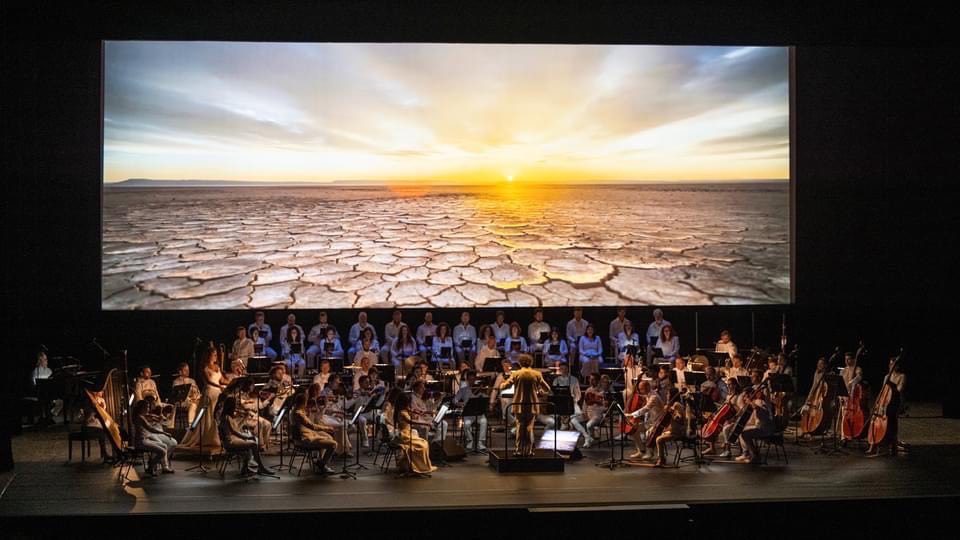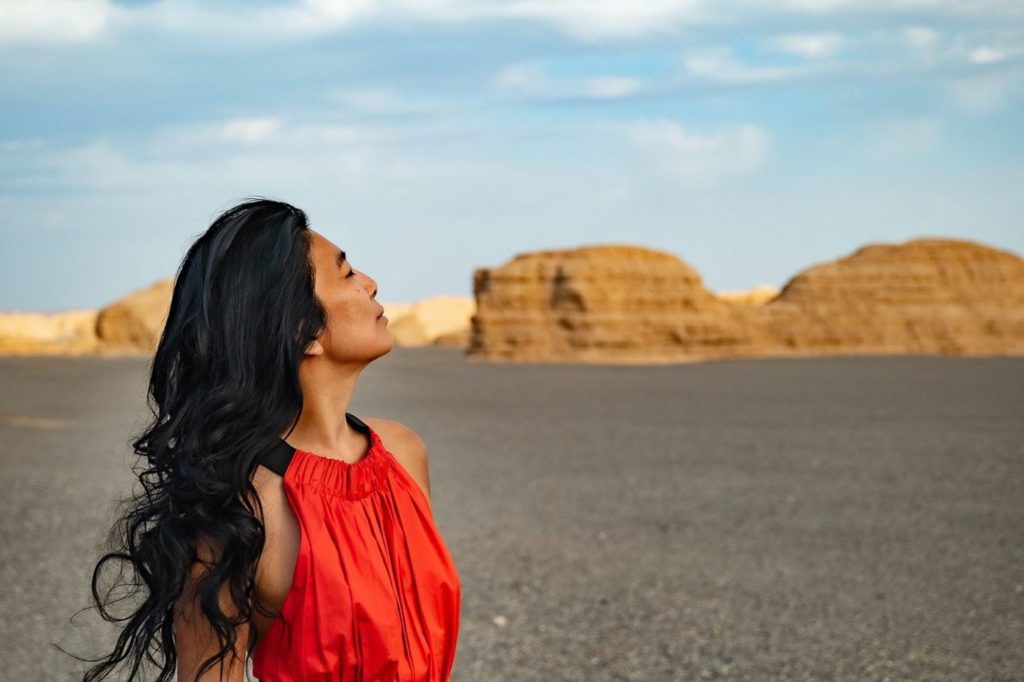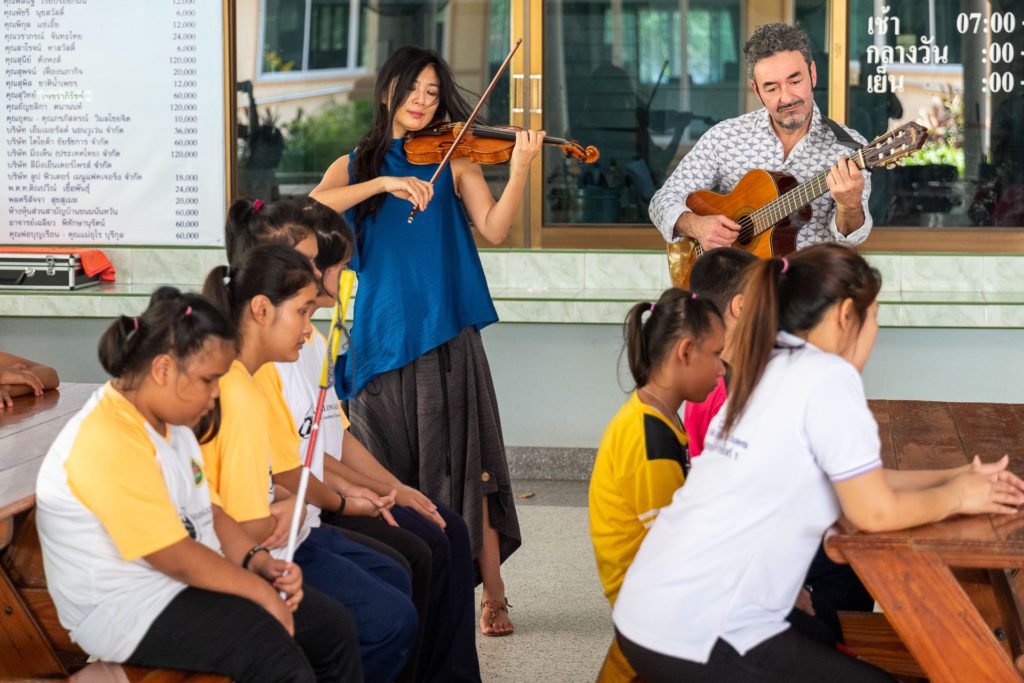Zhang Zhang is writing a book. Her autobiography. She is having strange dreams full of long-forgotten memories and “a lot of symbols,” but overall, she says, the process is cathartic.
A few French publishers had contacted her with the idea but she did not feel the time was right. Until the prestigious Editions Fayard came calling.
“The book is not finished yet,” says Zhang Zhang, when we meet at Mada One, one of the places she goes to write in the early afternoons. She writes in French. “That’s why it’s taking so long!” She laughs. She is wearing a black baseball hat and radiates energy and warmth. She greets every member of the staff and people turn their heads. Everybody knows her, of course. She is the most famous violinist in Monaco and beyond, one of the most generous of philanthropists, a public speaker, an activist and an outspoken artist addressing ‘cancel culture’.
“It all began when a well known French jazz musician made a very public and unfair criticism against the Vienna Philharmonic Orchestra on Twitter,” says Zhang with a cup of Jasmine tea in her hand. “He wrote that he was saddened by the lack of their diversity – meaning lack of racial diversity. The Vienna Philharmonic for classical musicians, at least for me, is a symbol of the best of what we do. and to see this institution as well as our entire profession being judged unjustly prompted my answer – I pointed out that he may not be aware that in most major symphony orchestras, when we audition for new members, candidates always perform behind a screen. The artists are recruited based on their artistic excellence and not on their gender or ethnicity. He didn’t like my answer. And the following public exchange on Twitter led to a very public discussion, and polemic, thousands of people took part. Which led to the Jazz artist going on French National television telling his side of the story, during which an image of me was used without my permission. I was being discussed and my position criticised on live TV by this artist and the journalists to an audience of millions. I immediately requested a ‘right to respond’. When the TV program ignored my request, other French journals came to me, as they felt it was unjust to only allow one side of the story without offering the “opponent” a chance to share the other side.”
“On February 23, 2021, my long article entitled: “No, there is no systematic racism in Classical Music” was published by FigaroVox, and within the first seven days more than 120,000 subscribers had read it. After that I was invited to give an interview on Europe 1 with Sonia Mabrouk, I also published in Causeur, Le Point, Fild Media, Le Droit de Vivre, Monaco Tribune, Reflet, and Figaro, as well as other on line media, defending Classical Music, and defying the rising trend of Cancel Culture. I became a sort of media warrior in defending my profession, as well as classical arts in general from the increasing attacks coming from the US in the name of social justice.”
“The same ideology that toppled statues and censored books is also circling around the musical arts. Certain operas and ballets have already became casualties. The subject is gaining attention from different political spectrums here in Europe as well. Last month my short video exposing the dangers of discrimination generated by cancel culture in classical music on NEO TV was watched by more than 141,000 viewers on Twitter and 179,000 on Facebook. Not always by those who agree, but it is important the subject is on the table so we can all examine it and try to understand its dangers.”

ZHANGOMUSIQ Orchestra at the 15th Anniversary Gala of the fpa2 – courtesy of the Foundation Prince Albert II
Zhang is now attacked regularly on social media, mostly on Twitter, on a daily basis. “Its been like this for one year now. Before the polemic started, I was mostly an observer on Twitter. In January 2021 I had about 800 followers, today I have 19,800, and it all happened organically. Often when I am engaged in a ‘fight’, some people will humorously say ‘Oh look, Zhang is fighting trolls again, let’s bring some popcorn and watch.’ I find humour an important attitude when dealing with such situations. Sometimes the fight goes on for days, sometimes for hours.”
“Sometimes it is a real discussion of ideas, even if heated. But sadly there are also a lot people who instead of using reason and arguments, resort to personal attacks, including racial slurs. My post may be about supporting women’s rights or universalism, I may receive posts that say: ‘Shut up you eater of dogs/cats/pangolins,’ or “You brought us the virus,’ rather primitive and childish, but nevertheless aggressive.”
“What is interesting is that many of those sending me racist comments are self-proclaimed anti-racists. I have been accused of Chinese political decisions from the past, the present and the imaginary. Some even take the trouble of taking an image of me and make a grotesque caricature of it and post it on my wall. While the gestures are ridiculous, it does demonstrate the topic which I have engaged in is one which is at the forefront of our society.”
“Sometimes well-meaning people tell me it is not worth it to acknowledge such people, but I disagree. If those of us in the public eye do not confront and expose these attempts at bullying, who will? Cyber trolling and on-line harassment is a real issue. It is especially dangerous for children and young people, sometimes resulting in tragedies. I believe it is important to expose and challenge such behaviour, not only to show the perpetrators their attitude is not acceptable, but also to show those who have been victims to not be afraid of such intimidation.”
Zhang’s engagement generates positive messages, too: “Sometimes people will send me a private message saying: Thank you for fighting. Thank you for standing up. A few times women and Asian persons wrote to say they have been afraid on social media because they have been harassed or bullied. Seeing me fighting the sexist and racist bullies made them feel supported and vindicated. Those are the messages that convince me that we must always stand up to bullies, who for the most part are also cowards. It is important to show other people that we stand up to bullies. We all need to see that bad guys don’t always win. Silence is not always an effective deterrence.”
Last year, Zhang Zhang was awarded the Jean Pierre-Bloch Prize, by LICRA: the International League against Racism and AntiSemitism. The Prize was created in memory of Jean Pierre-Bloch, founder of LICRA, a humanist, and ardent militant against racism and a leader of the French resistance during WWII. This prize rewards artists whose work is dedicated to the promotion of human rights.
“I am a universalist,” says Zhang, “Even if there is rich diversity in human cultures, from a neurological point of view, we are all born with the same brain. What unites us is far greater than that which separates us. All human beings are capable of creating beauty as well as destruction, able to create bombs but also music and poetry. I believe music is one of the most important symbol of universalism, even when we can not understand each other’s spoken language, we can appreciate each other’s songs.”

In the Gobi Desert Photo by Marco Strullu
Zhang Zhang was born into a musical and very progressive family. Her grandfather Lin Qi Wu came from a rich Chinese merchant family in Thailand and graduated from YenChing University in Beijing and Columbia University in the US. He returned to China and later became a professor at Peking University. Her grandmother, Chu Tsuan Tsi, also a graduate of YenChing, was an innovative sociologist and a pioneer in creating social aid for women and children in China in the 1930s.
Zhang’s father Zhang Yun Zhang was a well-known violinist and the concertmaster of Madame Mao’s (Chairman Mao Zedong’s wife Jiang Qing) favourite orchestra. He performed for US Presidents Richard Nixon, Gerald Ford and Jimmy Carter during their official visits to China. Her mother, Lin Ying, was a classic pianist and award-winning film actress with millions of fans.
Despite her parents’ fame, the family lived in a nine square-metre room, and she and her little brother slept on a broken sofa. In an interview for China Story she said: “Life is a question of priorities. Music was the priority for my family. We had no dining table, but we had a piano. For meals, we used the wooden piano bench as a small dining space.”
Zhang Zhang, born in Beijing, begun to learn the piano at the age of two and violin at the age of four. Between four and six years of age she attended the boarding kindergarten at the famed Winter Palace of Beijing, where her father went to give her weekly violin lessons, until he was arrested and imprisoned by Madame Mao for having attended the Tian An Men gatherings commemorating the passing of Premier Zhou En Lai.
In 1981, a few years after the Cultural Revolution, Zhang’s parents decided to move from China to Thailand to join the family there. They were only allowed to take one of their two children. They chose their daughter. Even though Leo could eventually join them five years later as an 11 year-old, the scar of this experience is still sensitive..
“I was uprooted quite young as a child, living in different countries, a migratory experience. I did not feel I belonged anywhere. I used to dream about my grandparents home in Beijing every week, with its beautiful bamboo garden. The older I became, the further I traveled, the more I was convinced there would never be a place I could call home, the feeling of exile was always in me.”
Two years after their arrival, Zhang’s parents established The Bangkok Symphony Orchestra, Thailand’s first professional Philharmonic orchestra. Zhang was their youngest violinist. She was eleven years-old.
At the age of 12, Zhang and her family moved to Toronto, Canada, where Zhang studied at the Royal Conservatory of Music. She made her solo debut at the age 14 with the Toronto Symphony Orchestra, at the age of 17 she begun touring with the famed Royal Winnipeg Ballet company. At 18, Zhang met the famous Romanian violinist Sergiu Luca, who accepted her into his class at Rice University in Houston, Texas, where she received a Bachelor’s degree in Music and a Master’s degree in Classical Violin Performance.
In 2000, while a student at the Conservatory de Lausanne in Switzerland, Zhang saw a poster in the school saying the Monte-Carlo Philharmonic directed by Maitre Marek Janowski was hiring violinists. She travelled on EasyJet from Geneva, and played the audition on April first, along with more than 100 candidates. By 18:00, she was offered a job as a first violinist in the OPMC.
Zhang became the first Chinese-born musician in the Orchestre Philharmonique de Monte-Carlo. In 2019, during the historical state visit of president Xi JinPing to Monaco, Zhang had the immense honour to perform in the Palais Princier for HSH Princess Charlene and Madame Xi Jin Ping in a program created especially for the occasion, with European and Chinese compositions. On this occasion, Madame Xi warmly said to Zhang: “You are the pride of all Chinese women.”

ZHANGOMUSIQ – School for Blind, Bangkok Photo by Marco Strullu
Zhang Zhang is a founding member of the Monaco String Quartet Ensemble, the Zhang Zhang Band pop group with Jazz Guitarist Leopoldo Giannola which performed weekly at Rascasse between 2002-2006, and ZHANGOMUSIQ, an innovative philanthropic organisation that unites communities through music by creating concerts where 100 percent of the concert revenue is given to humanitarian and ecological progress. Since 2007, more than 70 concerts have been created, benefiting NGOs from 35 countries.
“ZHANGOMUSIQ is an idea born in Monaco, created with the generosity and support of the government and the people of the Principality, transforming and innovating the existing business models of live musical performances beyond its traditional frontiers.” Zhang says with pride.
“ZHANGOMUSIQ concerts have generated funding which helped built schools, planted trees, provided drinking water, financed orphanages, supported the handicapped and the elderly. When I launched this new business model of music philanthropy, I was immediately encouraged and supported by the Government, including HSH Prince Albert. I do not believe that anywhere else in the world a young musician with neither fame nor fortune, armed only with a dream, would receive so much support and generosity the way I have in Monaco. When people refer to Monaco with the old cliché as a place destined only for the rich and famous, they are not seeing the whole picture.”
When asked if there are any particular projects that are especially close to her heart, she said: “There are countless projects that merits our attention and contribution, and ZHANGOMUSIQ tries to help as many as we can. Personally I think we do not talk enough about the welfare of the elderly. It is a harder subject than some others, such as educational aid, saving animals and of course the planet. Perhaps because the issue of elderly people remind us too much of our own mortality, and the failure to protect them is a evidence of our shortcomings – a society that abandons its elderly can not pride itself in being fully just or balanced.”
The 2020 pandemic put a stop to her three-year global musical philanthropic tour. During most of 2021, with well-known Monaco pianist Elzbieta Ziomek Fringant, Zhang played in retirement homes. The duo also offered regular performances at the Rainier II Gerontology Centre for residents suffering dementia and Alzheimers.
“We create programs especially for them, songs they would know, and music from their youth. If we are to offer the gift of music to patients and the elderly, we should not impose on them the music we want to play, but rather the music they enjoy listening to. Some of the most beautiful moments in my career are during these musical gatherings. Elzbieta has an immense collection of old songs, I would walk around from table to table, and observe which songs the residents liked the most, so we would play more of it! Often everyone is singing along and clapping hands to the music, even the patients who are no longer able to read a book or watch television. They do not forget the songs of their childhood. Imagine if everywhere in the world musicians bring music to every nursing home, hospitals with elderly patients? How much good we could bring?”
In the midst of the global pandemic, Zhang also founded the ZHANGOMUSIQ Orchestra, performing its inaugural concert on October 29, 2021, at the 15th Anniversary Gala and Awards ceremony of the Prince Albert II Foundation in the Salle des Princes of the Grimaldi Forum, sharing the stage with Robert Redford. In this inaugural concert, the orchestra united musicians of 11 nationalities from six major European Symphony Orchestras.
The ZHANGOMUSIQ Orchestra was created to promote musical philanthropy and musical diplomacy. Its concerts will be dedicated to raising funding and awareness towards climate initiatives and humanitarian projects in progress, as well as musical diplomacy engagements promoting the Principality of Monaco.
“During Covid when concert halls around the world were shut and concerts were performed only on streaming, in Monaco we did our full season from September 2020 – we had a live audience which is a testimony of how well the Principality managed this huge emergency. We were the only orchestra in the world playing to live audiences. That is exceptional,” says Zhang. Wherever she goes, she promotes a Monaco that not everybody out there is aware of. She laughs: ”It is not just James Bond and superyachts. Monaco is so much more.”
“Monaco offered me a home, an identity. And the immense opportunity to learn and create. To me Monaco is a model society of the 21st century. While preserving its culture and traditions, it is also a dynamic leader in innovation and exploration. Culturally, Technologically, Ecologically, and Sociologically. I would not be who I am today without Monaco, the past 21 years have been a great adventure, and I am looking forward to more.”
The lights go dim and the cafe will close soon. I asked her the last questions: What do you miss the most in Monaco? “Good old traditional northern Chinese food.” She winked.
What are you most proud of?
“The concrete humanitarian results generated by ZHANGOMUSIQ. over the past 15 years. We have experimented with a new social entrepreneurial model for live musical performances which directly benefits people in need. Our next challenge is to expand and promote this Made In Monaco social cultural innovation to many other parts of the planet.”
Zhang had a big birthday recently. Has anything changed for her over the last few years?
“My dress size!” she laughed
Zhang Zhang’s first book will be published by Edition Fayard in France at the end of 2022.
MAIN PHOTO: Zhang Zhang Dunhuang, photo by Marco Strullu


